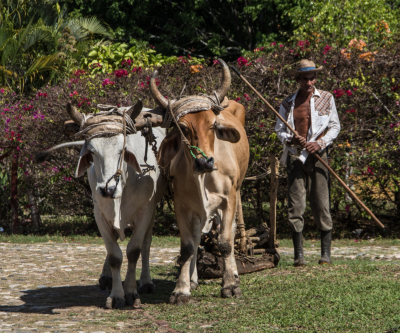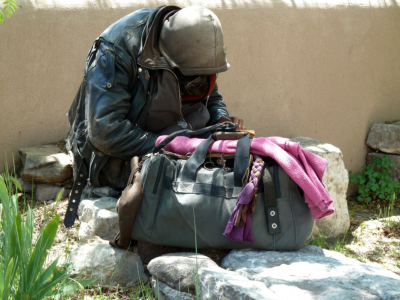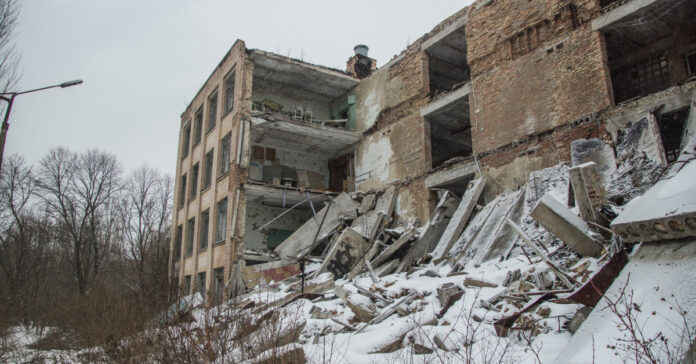I prep because I fear there will be a large-scale disaster that results in the death of hundreds of millions of Americans, and I want myself and my family to live through it and come out alive, healthy, and relatively well adjusted when things calm down.
In the more than 20 years I have been prepping, the cause of that disaster has changed. For a long time, I thought it would be the result of an attack by an outside force. A nuclear strike or some kind of enemy attack, like a 9/11 but 1,000 times worse. Or an unexpected natural disaster, like a comet strike or the Yellowstone Caldera blowing up and blanketing most of the U.S. with ash.
These days, I look at the moral decay around us, the decline in education, the theft of our history and our place on the world stage, the arrival of the very things we were warned about in Atlas Shrugged and 1984, and I cannot help by be concerned that we are witnessing the end of the United States for many of the same reasons that the Romans and other empires died: internal rot. I wonder if we might self-destruct, if our society has decayed to the point that’s socialists, Marxists, and communists will destroy us from the inside out.
Perhaps by adopting some socialist policies we have shot ourselves in the foot and the festering wound will lead to our eventual demise, the rate of infection increasing as time passes until by the time people notice, it is too late to stop. From where I am sitting, it feels like the downward slope is getting steeper.
Socialism Appeals to the Weak and Lazy
What if most of society today is too weak and stupid to see what is happening, like the frog in the pot as the water temperature rises? Suppose these sniveling idiots who wish to return to their mother’s teat where their every need was cared are the future of our country? What will happen if we turn our institutions over to snowflakes who have no knowledge of the real world and have made it this far in life thanks only to helicopter parents who cave in when they throw a tantrum. Is the promise of free college, “safe spaces,” no more mean cops enforcing laws, plenty of medical marijuana, and a permanent public dole sufficient to allow Socialism to sweep away the free market society we have enjoyed for close to 250 years?
Unfortunately, the answer may be yes.
Why Socialism Leads to an Economic Collapse
If our government move towards a Socialist or Marxist model, we have to assume that sooner or later it will be accompanied by an economic collapse. Why? Because every country that has moved from a capitalistic society to a Socialist model has suffered one or bother. (If you don’t believe me, read Socialism, the Failed Idea that Never Dies which explains how socialism has been tried 24 times in the past 100 years and each attempted ended in failure.)
Socialism is a drug that gives you a high for a few years followed by a long, slow collapse until you are on par with the crack whore that has no teeth, no self-respect, and no life.
Socialism is a Trip to the Bottom
A socialist government results in everyone living at the lowest level possible, which means eventually everyone is poor except for those very few who are in charge. In a free market, there are rich at the top and poor at the bottom, but there are also many levels in between, and there are opportunities for mobility between them.
Socialism does away with the mobility and the middle layers (the middle class) by simply driving everyone down to the bottom level, which is often lower than we can imagine. Today, poor Americans have cars, cell phones and big screen TVs. In Venezuela, they do not have medicine, electricity or running water. In Cuba they still have political prisoners, there is no free press, and most Cubans live on $20 a day. You can be arrested for criticizing the government, and just like in the old Soviet Union, there are stores where tourists can shop that Cubans cannot.
Cuba sank to its lowest common denominator after the Soviet Union collapsed because with the USSR’s subsidies, Cuba was unable to feed its populace. We are seeing the same thing happen in real time as Venezuela slides down into the morass of socialism. Societies that collapse, like Cuba and Venezuela, end up living at a level that would be more familiar to Americans from the 19th century than the 21st.

Socialism’s Failed Policies
Socialism spends more than it makes, and while that is easy to do for a limited time, the happy days of providing free stuff to the masses so they will adore you eventually comes to an end. At first, the steps are small, but the rate of decline increases as the deficit grows.
As the government strives to provide the basics to the unproductive masses, it must create new money, whether by running the printing presses or doing to electronically. Many countries have attempt to print their way out of a deficit. This is why you read of currencies with inflation rates in the thousands of percent per year, and sometimes per month.
These days, the U.S. government sells treasury bills to raise money and the Federal Reserve Bank often buys them with dollars it did not earn but simply created. This is the electronic equivalent of running the printing presses.
At some point, deficit spending catches up with the spender, be they an individual or the government. It’s like a family that makes $60,000 a year having a credit card debt of $75,000 with interest payments of $13,500. At some point, this cycle will collapse as the government will run out of money to operate and default on its loans, unable to pay interest.
We’ve seen situations like this in places like Greece, Argentina, the Soviet Union, and Venezuela. Before they default, socialist government that are desperate for money do one of several things:
Taxation
They increase taxes. This is the first step. But as taxes rise, two things happen: People work harder to avoid paying them, through legal loop holes of illegal methods like the black market or working for cash off-the-books; or they stop working altogether. If you make $5,000 a month and the government takes $1,000, the remaining $4,000 is still worth working for. But if things reverse, and your $5,000 monthly paycheck nets you only $1,000 after taxes, then why should you continue working? Especially when you could go on the dole and make more than that, probably tax free.
But there are other taxes beyond than income taxes. There is property tax, sales tax, use tax, gasoline tax, luxury tax, capital gains tax, inheritance and estate taxes, and some states are looking at taxing the money you have in the banks, a wealth tax. All it takes is an act of congress to raise taxes, and while they often target capital gains and implement taxes on the wealthy, eventually they have to tax everyone.
Confiscation
The second step is confiscation of private assets. We talked yesterday about confiscating land and private property like guns. While taxation is one form of confiscation, it is a subtle form. More obvious is when the government takes
Governments can also confiscate money right out of your bank account. First, they could simply take a percentage of the money everyone has in the bank and call it a one-time special assessment. The second way would be to create a new currency and exchange it for the old currency at the rate of 1 to 10.
They can also confiscate your person and your labor by arresting you and forcing you to work in a labor camp. This is when things get really ugly and governments look for excuses to arrest people simply because they need forced labor.
Of course, no politician in their right mind would promise this kind of treatment to the electorate, but it usually happens in 25 years. And when it does, those who voted for the free lifetime welfare and other promises that sounded too good to be true will probably not recognize that they started the ball rolling.
Nationalization
Governments can over confiscate a private business or industry, known as nationalization. Many define socialism as “government ownership of the means of production.” Hugo Chavez, the former strongman in Venezuela, nationalized not only the country’s oil industry, but its steel industry, much of its agriculture, banking, telecommunications, and its electrical utilities. Later, under his successor Maduro, the government took over grocery stores, soda bottling plants, and more.
Governments take these actions to raise money for the government and prevent companies from profiting. Unfortunately, governments usually suck at running private enterprise and what were once productive, profitable companies begin to fail. Not only do they lose money, but their efficiency and productivity drop, leading to less production and shortages. This is in part because governments give management of these companies to cronies who have never run anything more elaborate than a vote-rigging operation in their lives, but also because of rampant fraud and corruption. Because he nationalized the oil industry instead of leaving it in the hands of oil companies, Venezuela chief export and primary source of foreign currency all but disappeared.
What an Economic Collapse Looks Like
How do you know an economic collapse is starting? We’ve mentioned inflation, but here are a few additional symptoms:
International Trade Fails
When a country experiences an economic collapse, international trade stops because no supplier is willing to accept their currency. This is usually because the official exchange rate is well above the actual exchange rate. For example, the unofficial exchange rate for $1 in a street market in Iran is 375,000 Rials, the Iranian currency. The official, state-approved rate is 31,750 to $1. That means the true value of the Rial in terms of buying power in Iran is about 1/12th of what the government claims. What international company would want to accept Rials for payment, knowing that they were getting paid only a fraction of what their goods were worth?
When international commerce collapses because of currency problems, importers cannot buy overseas products because no one will accept their devalued currency and they cannot raise enough dollars due to inflation. Things made overseas, whether it is electronic or toilet paper, start to become scarce, and that drives up prices.
Domestic Trade Slows
A collapsing currency also makes commerce in the country difficult. Here is an example that is made up but is a valid illustration: An Iranian goes to the store and wants to buy a dozen eggs for 100,000 Rial, which is the government-approved price. The store says they are out of stock. Meanwhile, the store owner has taken all the eggs that were delivered to them and sold them to a black marketer for 600,000 per dozen. The black marketer sells them from the trunk of his car for 1.1 million Rial per dozen. The poor buyer cannot afford those eggs because he is being paid at the government-approved rate while the goods are being sold for their street value. This is why government enforced prices don’t solve any problems.
That is when barter comes into play. (That is also why it’s good to raise chickens!) Read our article on How to Prosper in a Barter Economy for suggestions.
Without a sound monetary system, much domestic commerce will also cease. If your bank account is frozen, the dollars in it worthless, how will you get paid? If you cannot be paid, or if you are paid with money that is of no value, then why work? And if no one works, things stumble to a halt. Food no longer goes from farm to table. Fuel no longer flows from wells to gas stations. Productive people cease to work and become destructive, stealing what they need to survive.
Scarcity Rears its Ugly Head
As Ayn Rand pointed out in Atlas Shrugged, when there is no incentive to work, people won’t. This is one reason production slumps when socialist governments take it over. When the manager and employees are working for a year-end bonus, they hustle. When they’re working for the good of the state, they call off, take it easy, and fail to meet production demands. That leads to scarcity of domestically produced goods, including foods.
Have you ever met a farmer? They take their livelihoods seriously because they have huge bills. They need to pay off the seed, the fertilized and the loan on their harvester, and the only way to do that is to have a profitable harvest. Imagine what happens to their motivation when the government ceases their land and forces them to plant their acreage. Do you think they are going to work late to plant those extra 20 acres or to get the harvest in before it rains? Would you?
It will be Brutal
In failed societies, we often see a collapse of law and order maintained by an objective justice system and duly elected government. It is replaced by strong men, war lords and others who have the military power to enforce the rules – their rules.
In some cases, this will be the army, the police, or both. Maybe it will be gangs. Perhaps it will differ from one locale to another.

But when there are limited resources, human life loses its value. It is easy to be nice and friendly when you are warm, dry and well fed. It is another thing altogether when you and your kids are starving.
Expect an increase in corruption by anyone in a position to extort anything from anyone. Expect an increase in crime and an increase in murder.
How to Prepare
If the socialists take over, you should be prepared to face taxation, confiscation, inflation, an increase in violent crime, a lack of available goods from overseas, and shortages and scarcity of goods in stores. Shortages imposed by an economic collapse will make the COVD-19 shortages, which lasted only a few months, look like a happy memory.
To prepare, you should move money into vehicle that are harder to tax or confiscate and will benefit from inflation by becoming worth more. That might mean buying some junk silver (read Precious Metals for Preppers) and burying it out back. It might mean investing in thousands of rounds of ammunition. You could invest in yourself by learning a new skill, like welding or forging and buying a welder or a forge and supplies. Trust me, when the tax collector comes, they are not going to put much value on that bar stock you have rusting behind the house.
To combat shortages, start a garden and raise small livestock like chickens or rabbits. (Rabbits are nice because they are quiet and your neighbors won’t hear them.) Plant berry bushes and fruit trees. Place mushroom spores on some logs in the back woods. Get a lifetime fishing and hunting license before they raise the price.
Focus onyour preps, especially food, medicine and ammo. Build them bit by bit, visiting different stores, and paying cash whenever possible. Have multiple ways to source and purify water. Consider burying some supplies or establishing an off-site cache. Develop hiding places in your house and outbuildings, if you are lucky enough to have any.
Buy weapons, both guns and impact weapons that do not require ammunition and can serve a dual purpose. For example, you might have a machete to keep the land clear, but it is a weapon when necessary. A hammer is a tool, but if you are threatened, it can be a weapon. Yes, have a gun, in fact, have multiple guns, but plan for what happens if they are confiscated.
Don’t Expect a Quick Recovery
I doubt an economic collapse will be isolated in the U.S. We are the train engine that pulls the world’s economy, and if the United States runs off the rails, much of the world will follow. Many of the first-world countries are too closely linked and intermingled with our economy to survive unscathed. Many of them will be dragged down behind us, in part because they too use dollars for international commerce but also because they count on the U.S. as an important trading partner.
When a disaster is isolated to a single region, help pours in from other regions. But when a global disaster strikes, like COVID-19, there is little one country can do for another because all their resources are absorbed taking care of their own. That means a U.S. collapse will turn into a global collapse, the effects of which will be felt far and wide.
Do not expect a quick recovery. And expect an eventual recovery to mean massive changes.
Read the companion piece to this article, Why You Must Prepare NOW to Survive Socialism







